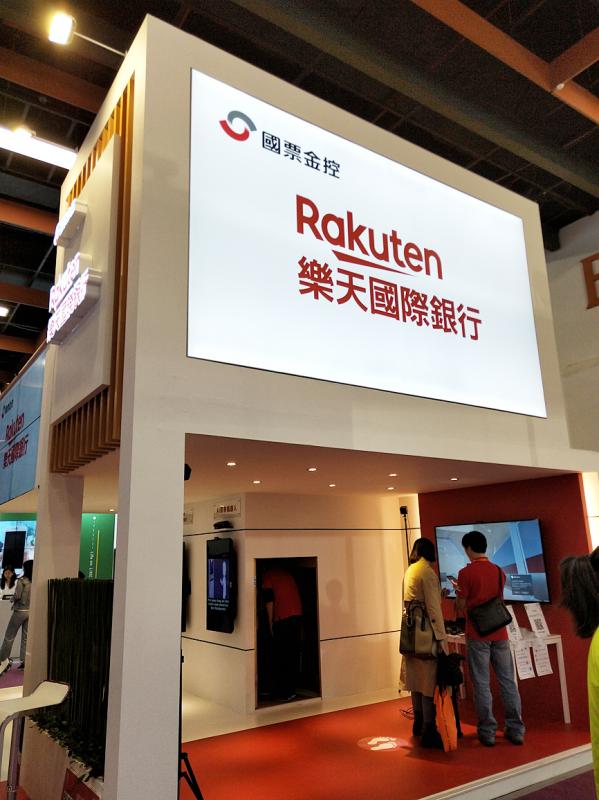IBF Financial Holdings Co (國票金控) on Thursday said that its Japanese joint-venture partner has agreed to waive a non-competition clause, paving the way for the company to invest in a commercial bank in Taiwan.
The partner is Japan-based e-commerce company Rakuten Group Inc, which, through its wholly owned subsidiaries Rakuten Bank and Rakuten Card, set up a virtual bank, Rakuten International Commercial Bank Co (樂天國際商銀), in partnership with IBF.
The Tokyo-based Rakuten Bank and Rakuten Card hold a combined 51 percent stake of the Web-only bank, with paid-in capital of NT$10 billion, while IBF holds the remaining 49 percent.

Photo: Lee Ching-hui, Taipei Times
IBF did not disclose whether it has or will compensate the Japanese partner for canceling the non-competition agreement, only saying that with the waiver, it can proceed with negotiations with the target firm, it said in a filing to the Taiwan Stock Exchange (TWSE).
Speculation has circulated that EnTie Commercial Bank (安泰銀行) is the target bank, but IBF executive vice president Andrew Chiu (邱銘恩) told the Taipei Times by telephone that the financial holding company is still evaluating which commercial bank to invest in and has not reached a final decision.
IBF’s board of directors has been discussing the investment since February, and while most directors agreed that IBF should seek acquisition opportunities, two independent board members — Chen Wei-lung (陳惟龍) and Wu Ching-sung (吳青松) — expressed concern that it could weaken IBF’s financial strength and ownership stability, company filings with the TWSE showed.
The pair said the acquisition would be too expensive, the target bank’s loan quality was not satisfactory, and if IBF issued convertible preferred shares to fund the deal as planned, it would affect the stability of its shareholding structure, the filings showed.
Under current banking regulations, IBF is not barred from acquiring a conventional bank even though it already has a virtual bank, Financial Supervisory Commission Chairman Thomas Huang (黃天牧) told a meeting at the Legislative Yuan in March.
However, the commission will have to consider whether IBF is financially sound to simultaneously support two banking units, as “it takes considerable capital to operate two different types of banks,” Banking Bureau Director-General Sherri Chuang (莊琇媛) told the meeting.
IBF chairman Wea Chi-lin (魏啟林) told an investors’ conference in April that acquiring a physical channel would raise the company’s efficiency, and IBF would pursue acquisitions that are good for shareholders’ equity.

CHIP WAR: Tariffs on Taiwanese chips would prompt companies to move their factories, but not necessarily to the US, unleashing a ‘global cross-sector tariff war’ US President Donald Trump would “shoot himself in the foot” if he follows through on his recent pledge to impose higher tariffs on Taiwanese and other foreign semiconductors entering the US, analysts said. Trump’s plans to raise tariffs on chips manufactured in Taiwan to as high as 100 percent would backfire, macroeconomist Henry Wu (吳嘉隆) said. He would “shoot himself in the foot,” Wu said on Saturday, as such economic measures would lead Taiwanese chip suppliers to pass on additional costs to their US clients and consumers, and ultimately cause another wave of inflation. Trump has claimed that Taiwan took up to

A start-up in Mexico is trying to help get a handle on one coastal city’s plastic waste problem by converting it into gasoline, diesel and other fuels. With less than 10 percent of the world’s plastics being recycled, Petgas’ idea is that rather than letting discarded plastic become waste, it can become productive again as fuel. Petgas developed a machine in the port city of Boca del Rio that uses pyrolysis, a thermodynamic process that heats plastics in the absence of oxygen, breaking it down to produce gasoline, diesel, kerosene, paraffin and coke. Petgas chief technology officer Carlos Parraguirre Diaz said that in

SUPPORT: The government said it would help firms deal with supply disruptions, after Trump signed orders imposing tariffs of 25 percent on imports from Canada and Mexico The government pledged to help companies with operations in Mexico, such as iPhone assembler Hon Hai Precision Industry Co (鴻海精密), also known as Foxconn Technology Group (富士康科技集團), shift production lines and investment if needed to deal with higher US tariffs. The Ministry of Economic Affairs yesterday announced measures to help local firms cope with the US tariff increases on Canada, Mexico, China and other potential areas. The ministry said that it would establish an investment and trade service center in the US to help Taiwanese firms assess the investment environment in different US states, plan supply chain relocation strategies and

WASHINGTON POLICY: Tariffs of 10 percent or more and other new costs are tipped to hit shipments of small parcels, cutting export growth by 1.3 percentage points The decision by US President Donald Trump to ban Chinese companies from using a US tariff loophole would hit tens of billions of dollars of trade and reduce China’s economic growth this year, according to new estimates by economists at Nomura Holdings Inc. According to Nomura’s estimates, last year companies such as Shein (希音) and PDD Holdings Inc’s (拼多多控股) Temu shipped US$46 billion of small parcels to the US to take advantage of the rule that allows items with a declared value under US$800 to enter the US tariff-free. Tariffs of 10 percent or more and other new costs would slash such